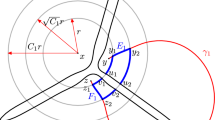Abstract
In previous papers, Mitter (J Stat Phys 163:1235–1246, 2016; Erratum: J Stat Phys 166:453–455, 2017; On a finite range decomposition of the resolvent of a fractional power of the Laplacian, http://arxiv.org/abs/1512.02877), we proved the existence as well as regularity of a finite range decomposition for the resolvent \(G_{\alpha } (x-y,m^2) = ((-\Delta )^{\alpha \over 2} + m^{2})^{-1} (x-y) \), for \(0<\alpha <2\) and all real m, in the lattice \({{\mathbb Z}}^{d}\) for dimension \(d\ge 2\). In this paper, which is a continuation of the previous one, we extend those results by proving the existence as well as regularity of a finite range decomposition for the same resolvent but now on the lattice torus \({{\mathbb Z}}^{d}/L^{N+1}{{\mathbb Z}}^{d} \) for \(d\ge 2\) provided \(m\ne 0\) and \(0<\alpha <2\). We also prove differentiability and uniform continuity properties with respect to the resolvent parameter \(m^{2}\). Here L is any odd positive integer and \(N\ge 2\) is any positive integer.
Similar content being viewed by others
References
Mitter, P.K.: On a finite range decomposition of the resolvent of a fractional power of the Laplacian. J. Stat. Phys. 163, 1235–1246 (2016). Erratum: J. Stat. Phys. 166, 453–455 (2017)
Mitter, P.K.: On a finite range decomposition of the resolvent of a fractional power of the Laplacian. arXiv:1512.02877
Adams, S., Kotecký, R., Muller, S.: Finite range decomposition for families of gardient Gaussian measures. J. Funct. Anal. 264, 169–206 (2013)
Brydges, D., Guadagni, G., Mitter, P.K.: Finite range decomposition of Gaussian processes. J. Stat. Phys. 115, 415–449 (2004)
Bauerschmidt, R., Brydges, D.C., Slade, G.: A renormalisation group method. III. Perturbative analysis. J. Stat. Phys. 159, 492–529 (2015)
Bauerschmidt, Roland: A simple method for finite range decomposition of quadratic forms and Gaussian fields. Probab. Theory Relat. Fields 157, 817–845 (2013)
Slade, G.: Critical exponents for long range \(O(n)\) models below the upper critical dimension. arXiv:1611.06169
Stein, E.M., Weiss, G.: Introduction to Fourier Analysis on Euclidean Spaces, 2nd Printing. Princeton University Press, Princeton (1975)
Terras, A.: Fourier Analysis on Finite Groups and Applications. London Mathematical Society Student Texts, vol. 43, 2nd Printing. Cambridge University Press, Cambridge (2001)
Acknowledgements
I wish to thank David Brydges for many helpful conversations and for setting me right on Poisson summation for a discrete torus. I also thank the diligent reviewers for their remarks, questions and suggestions.
Author information
Authors and Affiliations
Corresponding author
Appendix
Appendix
In this Appendix we prove the statements in the first paragraph of Remark 4. By definition the fluctuation covariances on the coarser scale \(L'= L^{r}\) with \(L\ge 2\) fixed and r a large positive integer is given by (1.17):
Therefore we get
For \(d\ge 3\), \(\forall p \ge 0\) and \(d=2\), \(\forall p \ge 1\) we can bound the sum on the right hand side by
and hence
which is (1.20) with a new constant independent of \(L'\) as claimed. \(\square \)
Rights and permissions
About this article
Cite this article
Mitter, P.K. On a Finite Range Decomposition of the Resolvent of a Fractional Power of the Laplacian II. The Torus. J Stat Phys 168, 986–999 (2017). https://doi.org/10.1007/s10955-017-1828-5
Received:
Accepted:
Published:
Issue Date:
DOI: https://doi.org/10.1007/s10955-017-1828-5



